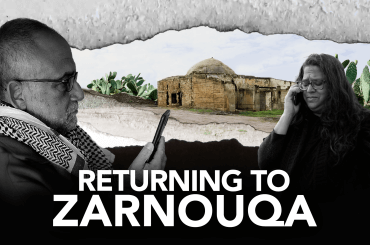‘Til Kingdom Come
directed by Maya Zinshtein
76 min. Abramorama Films 2020
If one wonders how nickels, dimes, and dollars collected in hundreds of churches across America shape the political decisions in the U.S. Congress and the State of Israel, director Maya Zinshtein’s film, ‘Til Kingdom Come, is required viewing.
A tour de force, her documentary—the culmination of three and a half years of research, relationship-building, and artistic film-making—exposes the peculiar bond between Christian Zionists, whose Biblical account of the last days calls for the death of two-thirds of the Jewish population, and Jewish colonists in the West Bank who welcome the Christians’ financial gifts and political influence but reject their theology.
Director Zinshtein takes the viewer inside the Binghamtown Baptist Church in rural Kentucky, where the Rev. Boyd Bingham, a third-generation pastor, preaches to his congregation beneath a Star of David imposed upon the cross in the front of the sanctuary, declaring, “We are the people that put Donald Trump in power.”
In a classroom where children have collected their loose change for Israel in buckets, Bingham tells them, “The Jews, they are better than us, all of us. You need to accept that… Every good thing we know, all the things we love about the Bible, they were given to us of the Jewish nation, Israel, their people, the Jews.”
The children understand that their offering will be distributed to Israelis suffering abject poverty by the International Fellowship of Christians and Jews (IFCJ). There’s a scene in which a Holocaust survivor in Israel tearfully opens her box of food that a representative of IFCJ has delivered.
What the children aren’t likely to understand are the documentary scenes that weave a tapestry that displays the geopolitical, theological, and economic goals of the disparate players:
- IFCJ’s president, Yael Eckstein—who is featured in the film—attending the Beverly Hills’ annual Friends of the Israel Defense Forces Gala, where IFCJ’s gift contributes to the over $5 million dollars that is raised;
- Pastor Boyd’s handing a church check for $25,000 to Eckstein—“for your blessing of Abraham on us”—against footage of his impoverished coal mining town;
- the opening of the U.S. Embassy to Jerusalem, accomplished in large part through the lobbying of John Hagee’s multi-million-member strong Christians United for Israel (CUFI)—the largest pro-Israel group in the U.S.—and that of other Christian Zionist pastors seen with Hagee and Trump at the opening; and
- the head of the Samaria Regional Council of Jewish colonies in the West Bank addressing the Republican Study Committee, the largest caucus of conservative members of Congress.
Through her extraordinary access, Zinshtein shows how powerbrokers with conflicting visions of the future—Christian Zionists and Jewish settlers—are shaping the narratives of U.S. support for Israel and Netanyahu’s plans for further annexation and the ethnic cleansing of Palestinians.
Released in 2020 and available on Prime Video, ‘Til Kingdom Come was presented recently in an online film salon hosted by Voices from the Holy Land (VFHL), “a nonprofit committed to bringing to a wider audience movies produced by Palestinians and others committed to justice, human rights and peace in the Palestine/Israel.”
Over 1,200 persons from around the globe registered to watch ‘Til Kingdom Come at no cost; over 400 persons participated in a panel discussion that followed.
The discussion, led by Lara Friedman, President of the Foundation for Middle East Peace (FMEP), is essential viewing for those who are curious about the appeal and impact of Christian Zionism. Director Zinshtein joined the conversation from Israel, answering questions about her extraordinary access to Boyd, Eckstein, and others. Other panelists, Mark Braverman, Bruce Fisk, and Don Wagner brought a wealth of experience and knowledge to what turned out to be an important conversation about the intersection of Christian Evangelicals, Christian Zionists, Biblical theology, and contemporary events.
Of particular interest: Fisk, Senior Research Fellow at the Network of Evangelicals for the Middle East, describes eight factors that have led to the troubling kinship with Israel and the apocalyptic thinking on the part of many.
Wagner, whose memoir Glory to God in the Lowest was recently released, spoke of his experience of being raised in a fundamentalist Christian family with the theology that gave rise to the notion that unfolding events in Israel herald the end times.
Braverman, Executive Director of Kairos USA, was asked to speak to his perspective on the film as a Jew with deep family roots in the Holy Land. He said, “Underneath the smooth talk of mutual love and respect [between Jews and Christians featured in the film], there is no trust for the other. What we have here is not a joining together in belief and commitment to a common vision for the world… [but] an arrangement in which both sides benefit, and it’s about money and power.”
Voices from the Holy Land’s next salon, its 35th consecutive event, will feature The Law and the Prophets, a film by Joshua Vis. You can register here to watch the film for free at your convenience and be notified about the panel discussion on March 19.


“India: The Modi Question” (2023) recently became available for streaming on Amazon/BBC Select.
I just watched it and saw a lot of similarities between Modi’s India and Netanyahu’s/Ben-Gvir’s/Smotrich’s Israel.
A free one-week trial of BBC Select is available.
■ “India: The Modi Question” on Amazon/BBC Select – https://www.amazon.com/gp/video/detail/B0BX3PH521
Having viewed the Zoom session associated with this film – which was excellent – I have a question:
Do I understand it correctly that all those Christian Zionists “support” Israel because of their embrace of a genocidal biblical prophecy which would seem to indicate that they want to see Israel succeed at its goal of “ingathering” all the Jewish people of planet Earth so that, once that is accomplished, they can then be annihilated thereby fulfilling the prophecy?
Do I have that right?
If yes, I must ask why it is that Christian Zionist “love” isn’t considered a powerful, though-not-yet-so-visible, form of antisemitism?
Christian Zionist love for Jewish people seems akin to being shanghaied: total strangers who act performatively as friends and mates but who are actually using trickery to lull victims so they can be sent off to a fate diabolical.
With friends like that…
I have just finished watching ‘Til Kingdom Come ($3.99 for SD on Amazon).
It was truly superb. Beautifully done!
Lara Friedman was especially impressive.
I also rated it on IMDb.
I look forward to viewing the discussion, led by Lara Friedman.
“Jewish colonists in the West Bank … welcome the Christians’ financial gifts and political influence but reject their theology.”
The Jewish colonists think they are duping the foolish Christians.
And they are. Here’s a related documentary that goes into the nature of that deception from the viewpoint of a Christian pastor. He concluded that the claims of the Zionists were not supported by Christian teachings, but were actually heresy in putting Israel ahead of Christ.
“Christian Zionism: The Tragedy & The Turning”
https://whtt.org/christian-zionism-the-tragedy-the-turning-part-i/
Those ‘churches’ might be zionist. But as sure as Judas is in hell, they ain’t Christian.